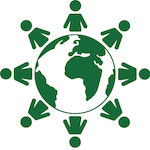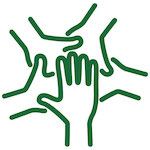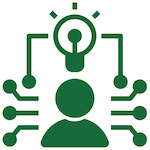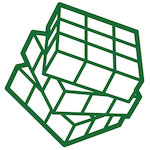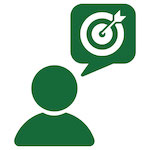Cultivating Well-Being
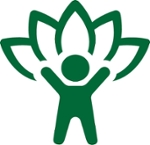 Students effectively engage in cultivating well-being when they reflect on what they are doing, how it is working, and make appropriate adjustments to be successful. They engage in thoughtful decision-making and are self-aware and reflective, so they can purposefully navigate adversity. Students respect personal limits and boundaries, and they deliberately engage in healthy persistence in the face of change.
Students effectively engage in cultivating well-being when they reflect on what they are doing, how it is working, and make appropriate adjustments to be successful. They engage in thoughtful decision-making and are self-aware and reflective, so they can purposefully navigate adversity. Students respect personal limits and boundaries, and they deliberately engage in healthy persistence in the face of change.What this could look like across a program, for a learner, and in a single course:
| When I am learning | When I am ready to work with others | When I am prepared for my career | |
|---|---|---|---|
| What competency development might look like across a program... |
I know my personal needs, wants, values, and behaviour patterns, and use strategies to manage personal responses effectively. I use reflection to identify personal limits in knowledge and understanding to create opportunities for growth I stay up to date on changes to disciplinary knowledges and processes. |
I recognize opportunities to use the strengths of other individuals or groups to compliment personal skills and respond well to change. I model and share patterns of reflection, self-assessment, setting limits, and goal setting with the intent of promoting group wellness, support and cohesion. |
I identify sources of community strength, resilience and support. I anticipate the consequences of actions on the 5Ps: People, Planet, Prosperity, Peace, Partnership. |
| What this might look like for a student... | Latifah balances her academic life, her job, and her relationships carefully, paying special attention to the challenges she has during midterms and finals. She anticipated issues with use of newer technologies in the lab, and left space to give herself time to get help. | Latifah reflects about her contributions to her group and identifies how she can improve moving forward. She completes accurate and helpful peer assessment of the other group members' work and is careful not to rescue other members of the group who did not complete their work. She communicates with her professor and helps the group modify the plan. | Latifah is doing a project for the Meewasin Valley Authority (MVA) in one of her classes. Latifah considers the consequences of her recommendations to the MVA for people and sustainability. Her interviews with community residents highlight the best ways to utilize volunteers. |
| What this might look like in a course... | In his Calculus course, Dr. Lee fosters his students' well-being by integrating reflective activities, group projects, and real-world applications. At the beginning of the semester, Dr. Lee assigns reflective journals where students document their experiences with mathematical challenges and strategies for managing stress and workload. He facilitates strengths-based group projects, encouraging students to identify and utilize each other's strengths to solve complex problems collaboratively. Dr. Lee also incorporates community-based projects where students apply mathematical concepts to real-world issues, such as optimizing resource allocation for a local non-profit. This approach helps students like Latifah learn to balance academic pressures, reflect on their learning processes, and develop strategies for personal and group well-being, preparing them to navigate adversity and engage in thoughtful decision-making in their future careers. | ||
Undergraduate Student Competency Program Rubrics – utilize or adapt this rubric for programs and courses.
Other ideas for developing this competency in the classroom:
- Reflective Activities: Have students maintain journals documenting their experiences, challenges, and personal growth throughout the course. Provide prompts to guide their reflections. Use self-assessment tools to help students evaluate their well-being practices and set goals for improvement.
- Peer Support Networks: Create peer support networks where students can share experiences and strategies for managing stress and promoting well-being.
- Well-being Case Studies: Provide case studies focused on well-being challenges and effective strategies for addressing them. Facilitate group discussions on these case studies.
- Simulated Scenarios: Use simulations to create scenarios where students must navigate personal and group well-being challenges, make decisions, and reflect on the outcomes.
- Portfolio Development: Have students create portfolios documenting their well-being practices, reflections, and personal growth. Include evidence of their strategies and their impact.
Support
The Gwenna Moss Centre for Teaching & Learning
- Connect with us to get one-to-one strategies to help learners develop this competency in your classroom. Email gmctl@usask.ca for information.
Career Services
- FUSION modules: Inclusivity, Adaptability, Self-Management, Metacognition, Creativity & Innovation, Problem Solving, Communication
University Library
- JumpStart your Learning - A program designed to enhance university learning skills, fostering personal well-being by helping students manage stress and academic challenges.
- Learning and Reflection – A resource that encourages reflective practices, helping students connect personal growth with their academic and professional goals.
- Motivation and Goal Setting - Resources that aid students in setting academic and personal goals, fostering a growth mindset and resilience.
- Learning Hub - helps instructors find academic skills resources, tutorials, and other learning support services for students. These resources can be integrated into courses as appropriate to support the development of USask graduate competencies
- Instructors can request workshops and custom materials from learning specialist and librarians tailored to course needs to support the USask graduate competencies.


